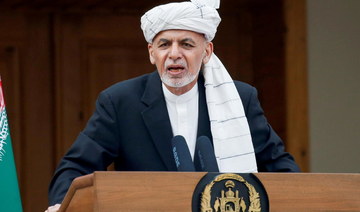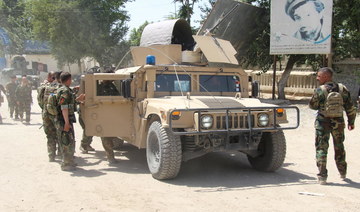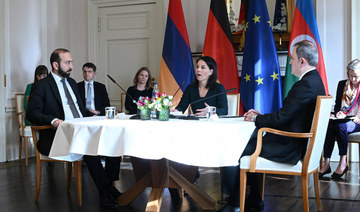WASHINGTON: US President Joe Biden meets Afghan President Ashraf Ghani and his former political foe, Abdullah Abdullah, on Friday to discuss Washington’s support for Afghanistan as the last US troops pack up after 20 years of war and government forces struggle to repel Taliban advances.
The Oval Office meeting may be as valuable to Ghani for its symbolism as for any new US help because it will be seen as affirming Biden’s support for the beleaguered Afghan leader as he confronts Taliban gains, bombings and assassinations, a surge in COVID-19 cases and political infighting in Kabul.
“At a time when morale is incredibly shaky and things are going downhill, anything one can do to help shore up morale and shore up the government is worth doing,” said Ronald Neumann, a former US ambassador to Kabul. “Inviting Ghani here is a pretty strong sign that we’re backing him.”
Biden’s embrace, however, comes only months after US officials were pressuring Ghani to step aside for a transitional government under a draft political accord that they floated in a failed gambit to break a stalemate in peace talks.
Biden’s first meeting as president with Ghani and Abdullah, chairman of the High Council for National Reconciliation, will focus on “our ongoing commitment to the Afghan people” and security forces, said White House deputy press secretary Karine Jean-Pierre.
Biden has asked Congress to approve $3.3 billion in security assistance for Afghanistan next year and is sending 3 million doses of vaccines there to help it battle COVID-19.
Biden will urge Ghani and Abdullah, foes in Afghanistan’s two last presidential elections, “to be a united front” and he will reaffirm US support for a negotiated peace deal, Jean-Pierre said.
US officials, however, have been clear that Biden will not halt the American pullout – likely to be completed by late July or early August – and he is unlikely to approve any US military support to Kabul to halt the Taliban’s advances beyond advice, intelligence, and aircraft maintenance.
Before heading to the White House, Ghani held a second day of meetings on Friday on Capitol Hill, where Biden’s withdrawal decision met objections from many members of both parties.
US House of Representatives Speaker Nancy Pelosi, welcoming Ghani to a bipartisan leadership meeting, said she looked forward to hearing about what more can be done with US humanitarian aid, especially for women and girls. Many lawmakers and experts have expressed deep concerns that the Taliban — if returned to power — will reverse progress made on the rights of women and girls, who were harshly repressed and barred from education and work during the insurgents’ 1996-2001 rule.
The Ghani-Abdullah visit comes with the peace process stalled and violence raging as Afghan security forces fight to stem a Taliban spring offensive that threatens several provincial capitals and has triggered mobilizations of ethnic militias to reinforce government troops.
US Secretary of State Antony Blinken, speaking during a visit on Friday to Paris, said Washington is “looking very hard” at whether the Taliban are “serious about a peaceful resolution to the conflict.”
The crisis has fueled grave concerns that the Taliban could regain power — two decades after the US-led invasion ended their harsh version of Islamist rule – allowing a resurgence of Al-Qaeda. US and UN officials say the extremists maintain close links with the Taliban.
“The Pentagon and the intelligence community are saying it is very likely that Al-Qaeda will come roaring back. It is very likely that our soldiers and our troops may have to go back into Afghanistan,” said US Representative Mike Waltz, a former Army officer who commanded US Special Forces in Afghanistan.
US officials respond that the United States will be able to detect and thwart any new threats by Al-Qaeda or other extremists. The Taliban insist Al-Qaeda is no longer in Afghanistan.
US government sources familiar with US intelligence reporting describe the situation as dire. Ghani, they said, has been urged to do more to step up pressure on the insurgents while US-led coalition forces are still there.
Biden, who pledged to end America’s “forever wars,” announced in April that all US forces would be out of Afghanistan by the anniversary of the Sept. 11, 2001, attacks by Al-Qaeda on the United States.
He made the decision even though a 2020 US-Taliban deal forged under former President Donald Trump set May 1 as the US pullout deadline.
Biden meets Afghan leaders as US troops leave, fighting rages
https://arab.news/zwru5
Biden meets Afghan leaders as US troops leave, fighting rages
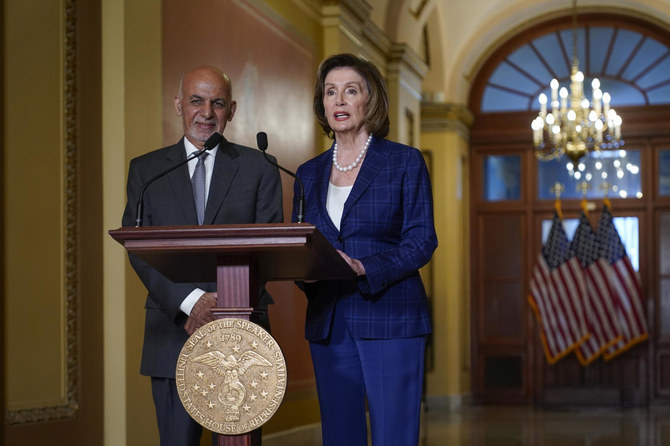
- The Oval Office meeting may be as valuable to Ghani for its symbolism as for any new US help because it will be seen as affirming Biden’s support for the beleaguered Afghan leader
- Biden, who pledged to end America’s ‘forever wars,’ announced in April that all US forces would be out of Afghanistan by the anniversary of the Sept. 11, 2001, attacks
Armenia’s prime minister in Russia for talks amid strain in ties
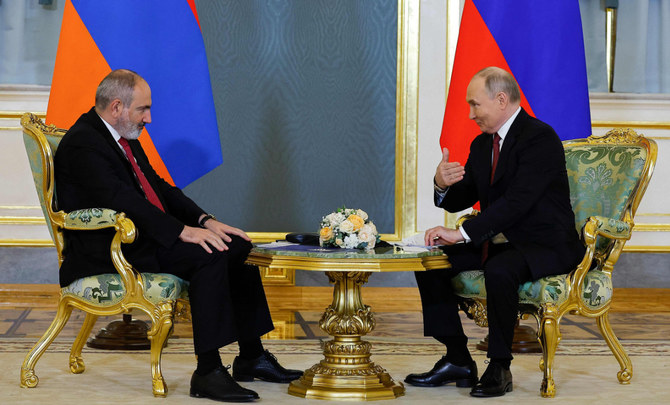
- Putin hosted Nikol Pashinyan for talks following a summit of the Eurasian Economic Union, a Moscow-dominated economic alliance
- Armenia’s ties with its longtime sponsor and ally Russia have grown increasingly strained after Azerbaijan waged a lightning military campaign in September to reclaim the Karabakh region
MOSCOW: Armenia’s prime minister visited Moscow and held talks Wednesday with Russian President Vladimir Putin amid spiraling tensions between the estranged allies.
Putin hosted Nikol Pashinyan for talks following a summit of the Eurasian Economic Union, a Moscow-dominated economic alliance. that they both attended earlier in the day. The negotiations came a day after Putin began his fifth term at a glittering Kremlin inauguration.
In brief remarks at the start of the talks, Putin said that bilateral trade was growing, but acknowledged “some issues concerning security in the region.”
Pashinyan, who last visited Moscow in December, said that “certain issues have piled up since then.”
Armenia’s ties with its longtime sponsor and ally Russia have grown increasingly strained after Azerbaijan waged a lightning military campaign in September to reclaim the Karabakh region, ending three decades of ethnic Armenian separatists’ rule there.
Armenian authorities accused Russian peacekeepers who were deployed to Nagorno-Karabakh after the previous round of hostilities in 2020 of failing to stop Azerbaijan’s onslaught. Moscow, which has a military base in Armenia, has rejected the accusations, arguing that its troops didn’t have a mandate to intervene.
The Kremlin, in turn, has been angered by Pashinyan’s efforts to deepen ties with the West and distance his country from Moscow-dominated security and economic alliances.
Just as Pashinyan was visiting Moscow on Wednesday, Armenia’s Foreign Ministry announced that the country will stop paying fees to the Collective Security Treaty Organization, a Russia-dominated security pact. Armenia has previously suspended its participation in the grouping as Pashinyan has sought to bolster ties with the European Union and NATO.
Russia was also vexed by Armenia’s decision to join the International Criminal Court, which last year indicted Putin for alleged war crimes connected to the Russian action in Ukraine.
Moscow, busy with the Ukrainian conflict that has dragged into a third year, has publicly voiced concern about Yerevan’s westward shift but sought to downplay the differences.
Kremlin spokesman Dmitry Peskov conceded Tuesday that “there are certain problems in our bilateral relations,” but added that “there is a political will to continue the dialogue.”
AstraZeneca to withdraw COVID vaccine globally as demand dips

- AstraZeneca says initiated worldwide withdrawal due to “surplus of available updated vaccines”
- Drugmaker has previously admitted vaccine causes side effects such as blood clots, low blood platelet counts
AstraZeneca said on Tuesday it had initiated the worldwide withdrawal of its COVID-19 vaccine due to a “surplus of available updated vaccines” since the pandemic.
The company also said it would proceed to withdraw the vaccine Vaxzevria’s marketing authorizations within Europe.
“As multiple, variant COVID-19 vaccines have since been developed there is a surplus of available updated vaccines,” the company said, adding that this had led to a decline in demand for Vaxzevria, which is no longer being manufactured or supplied.
According to media reports, the Anglo-Swedish drugmaker has previously admitted in court documents that the vaccine causes side-effects such as blood clots and low blood platelet counts.
The firm’s application to withdraw the vaccine was made on March 5 and came into effect on May 7, according to the Telegraph, which first reported the development.
The Serum Institute of India (SII), which produced AstraZeneca’s COVID-19 vaccine under the brand name Covishield, stopped manufacturing and supply of the doses since December 2021, an SII spokesperson said.
London-listed AstraZeneca began moving into respiratory syncytial virus vaccines and obesity drugs through several deals last year after a slowdown in growth as COVID-19 medicine sales declined.
Ex-national security adviser criticizes UK PM for not suspending arms sales to Israel

- Lord Peter Ricketts: ‘Pity’ govt ‘could not have taken a stand on this and got out ahead of the US’
- American decision to pause delivery of weapons seen as warning to Israel to abandon or temper plan to invade Rafah
LONDON: A former UK national security adviser has condemned Prime Minister Rishi Sunak for failing to suspend weapons sales to Israel, The Independent reported on Wednesday.
After the US paused a delivery of bombs, Sunak has yet to follow suit despite mounting pressure from within his own Conservative Party.
Lord Peter Ricketts, a life peer in the House of Lords and retired senior diplomat, said Britain should have been “ahead of the US” in ending arms sales to Israel.
The US decision to pause the shipment of bombs is seen as a warning to Israel to abandon or temper its plan to invade Rafah in southern Gaza.
More than 1 million Palestinian civilians are sheltering in the city after being forced out of northern sections of the enclave.
Ricketts said it is a “pity” that “the government could not have taken a stand on this and got out ahead of the US.”
Conservative MP David Jones made the same call in comments to The Independent, saying: “We should give similar consideration to a pause.”
He added: “Anyone viewing the distressing scenes in Gaza will want to see an end to the fighting. Hamas is in reality beaten. Now is the time for diplomacy to bring this dreadful conflict to an end.”
At Prime Minister’s Questions in the House of Commons, Sunak faced a flurry of questions over Britain’s potential ties to an Israeli invasion of Rafah. He said the government’s position remains “unchanged.”
Taliban deny Pakistani claims of Afghan involvement in attack on Chinese workers

- According to Islamabad, suicide attack that killed 5 Chinese in Pakistan was planned in Afghanistan
- Afghan Defense Ministry says the March attack showed weakness of Pakistan’s security agencies
KABUL: The Taliban on Wednesday rejected allegations of Afghan involvement in a recent deadly attack on Chinese workers in neighboring Pakistan.
The five Chinese nationals, who were employed on the site of a hydropower project in Dasu in northwestern Khyber Pakhtunkhwa province bordering Afghanistan, were killed alongside their driver in a suicide blast on March 26.
Pakistan’s military said on Tuesday that the attack was planned in Afghanistan and that the suicide bomber was an Afghan citizen.
Maj. Gen. Ahmad Sharif, a spokesperson for Pakistan’s army, also told reporters that Islamabad had “solid evidence” of militants using Afghan soil to launch attacks in Pakistan, that since the beginning of the year such assaults had killed more than 60 security personnel and that authorities in Kabul were unhelpful in addressing the violence.
The Taliban’s Ministry of Defense responded on Wednesday that the claims were “irresponsible and far from the reality.
“Blaming Afghanistan for such incidents is a failed attempt to divert attention from the truth, and we strongly reject it,” Enayatullah Khwarazmi, the ministry’s spokesperson, said in a statement.
“The killing of Chinese citizens in an area of Khyber Pakhtunkhwa, which is under tight security cover of the Pakistani army, shows the weakness of the Pakistani security agencies or cooperation with the attackers.”
The Dasu attack followed two other major assaults in regions where China has invested more than $65 billion in infrastructure projects as part of its wider Belt and Road Initiative.
On March 25, a naval air base was attacked in Turbat in Pakistan’s Balochistan province, and on March 20, militants stormed a government compound in nearby Gwadar district, which is home to a Chinese-operated port.
Pakistan is home to twin insurgencies, one by militants related to the Tehreek-e-Taliban Pakistan — the Pakistani Taliban — and the other by ethnic separatists who seek secession in southwestern Balochistan province, which remains Pakistan’s poorest despite being rich in natural resources.
While the attacks in Balochistan were claimed by the Baloch Liberation Army — the most prominent of several separatist groups in the province, no group claimed responsibility for the one in Dasu.
Blaming it on Afghanistan, however, was “baseless,” according to Naseer Ahmad Nawidy, an international relations professor at Salam University in Kabul.
“The insurgency in the region has existed for very long now and cannot be attributed to a specific area or country. Pakistan looks at the Islamic Emirate in its current form as a threat to its interests. The Pakistan government needs to develop its relations with the Islamic Emirate based on equal rights and goodwill for stability in the whole region,” Nawidy told Arab News.
“Stability in the region requires mutual cooperation and trust. The governments in Afghanistan and Pakistan must end the relations crisis at the earliest. Repeating such claims will further increase the tensions and may cause enmity between the two countries.”
Abdul Saboor Mubariz, a political scientist and lecturer at Alfalah University in Jalalabad, said that Pakistan’s claims were meant to put pressure on the Taliban to help Islamabad in its campaign against the TTP.
“Pakistan’s government is using different forms of pressure such as forcible deportation of Afghan refugees, claims about security threats from Afghanistan, closing border points and creating challenges for Afghan traders,” he said, adding that accusations and claims of links to attacks were affecting the Taliban administration as it still sought recognition from foreign governments.
“The claims are critical for the Islamic Emirate as it is seeking engagement with the countries in the region and across the globe, while the government remains unrecognized by all world countries.”
India PM Modi’s party deletes X post accused of targeting Muslims

- Video featured opposition politicians scheming to abolish programs for marginalized Hindus, distribute them to Muslims
- India’s PM Modi, expected to win polls, has made controversial remarks in election speeches, referring to Muslims as “infiltrators”
New Delhi: Indian Prime Minister Narendra Modi’s party on Wednesday deleted a cartoon video posted on social media platform X that was criticized for targeting minority Muslims during an ongoing national election.
India’s election code bans campaigning based on “communal” incitement but the Hindu-nationalist Bharatiya Janata Party (BJP) has frequently invoked the country’s main religious divide on the campaign trail.
The video, posted by an official BJP account, featured caricatures of opposition politicians scheming to abolish special affirmative action programs for marginalized Hindu groups and instead distribute them to Muslims.
The election commission wrote to the platform’s Indian office on Tuesday saying the “objectionable” post violated Indian law.
On Wednesday the original post had disappeared from the platform, with a notice saying it had been deleted.
A police complaint filed by the opposition Congress party accused the video of promoting “enmity between different religions.”
Modi, who is widely expected to win a third term in office when the six-week general election concludes next month, has made similar claims to the video in campaign appearances since last month.
He has used public speeches to refer to Muslims as “infiltrators” and “those who have more children,” prompting condemnation from opposition politicians, who have complained to election authorities.
On Tuesday he again said that his political opponents would “snatch” affirmative action policies meant for disadvantaged Hindus and redirect them to Muslims.
Modi remains widely popular a decade after coming to power, in large part due to his government’s positioning of the nation’s majority faith at the center of its politics, despite India’s officially secular constitution.
That in turn has made India’s 220-million-plus Muslim population increasingly anxious about their future in the country.
The BJP last month published another contentious animated video on Instagram in which a voiceover warned that if the opposition came to power, “it will snatch all the money and wealth from non-Muslims and distribute them among Muslims, their favorite community.”
The video was removed after several users reported it for “hate speech.”



